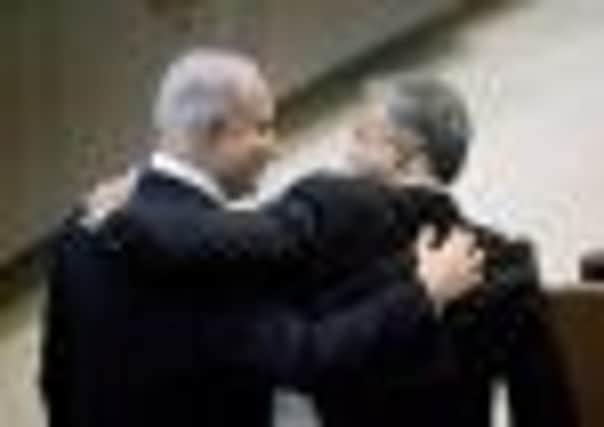Israel ready to talk peace, says Netanyahu


His conciliatory tone came during a speech at the inauguration of his new cabinet, but Palestinian officials reacted cautiously, saying deeds rather than words would indicate if there was any shift in Israeli policy.
They also restated their demand for a freeze on the construction of Israeli settlements in the occupied West Bank.
Advertisement
Hide AdAdvertisement
Hide AdMr Netanyahu, detailing his priorities for his new term, said he hoped to revive peace efforts, which were moribund under his leadership over the past four years.
“We extend our hand in peace to the Palestinians,” he said. “Israel has proven time and again it is ready for concessions in exchange for real peace, and the situation today is no different.
“With a Palestinian partner that is ready to hold negotiations in good will, Israel will be ready for a historic compromise that will end the conflict once and for all.”
Mr Netanyahu did not spell out what that compromise might be or specify any steps Israel would take to improve the poisoned atmosphere that has prevailed in recent years, such as the release of prisoners that the Palestinians are demanding.
However, he has rejected Palestinian demands that Israel freeze its construction of settlements as a precondition for talks.
His remarks come in advance of the arrival of Barack Obama, who is due to land in Israel tomorrow for his first visit as US president.
Mr Obama has signalled he will not pressure Israel for concessions on the Palestinian issue during the trip and will leave the task of relaunching negotiations to follow-up visits by his secretary of state, John Kerry.
Mr Netanyahu’s remarks appeared aimed in part at placating his new centrist coalition partner, the Yesh Atid party, which has called for a resumption of peace negotiations with the Palestinians.
Advertisement
Hide AdAdvertisement
Hide AdYesh Atid did well in January’s polls, campaigning on domestic issues such as the high cost of living and ending military-draft exemptions for the ultra-orthodox. Parties representing the latter are outraged at being excluded from government for the first time in a decade.
Mr Netanyahu played down domestic issues in his speech, saying there would be a “golden moment” to deal with them and that his first concern was to protect Israel. He listed suspected Iranian efforts to attain nuclear weapons capability, instability in Egypt and the civil war in Syria, with the threat advanced weaponry could reach Israel’s enemies, as the chief concerns. “That is why the first priority in the course of the new government will be the protection of the state and its citizens,” he said.
Given who now holds key cabinet posts, it is questionable how far Mr Netanyahu will actually go on the Palestinian issue.
New justice minister Tzipi Livni believes she has a mandate to restart peace diplomacy, but the housing and defence ministries are in the hands of Uri Ariel, a settler leader, and Moshe Yaalon, a hard-line former army chief of staff who made his name by crushing the second intifada uprising. His deputy is Danny Danon, who has advocated annexation of the settlements to Israel.